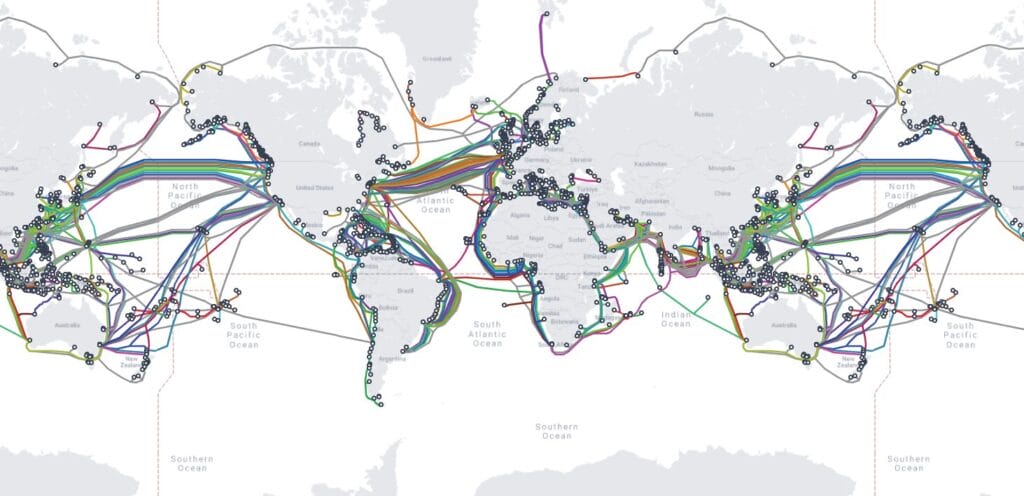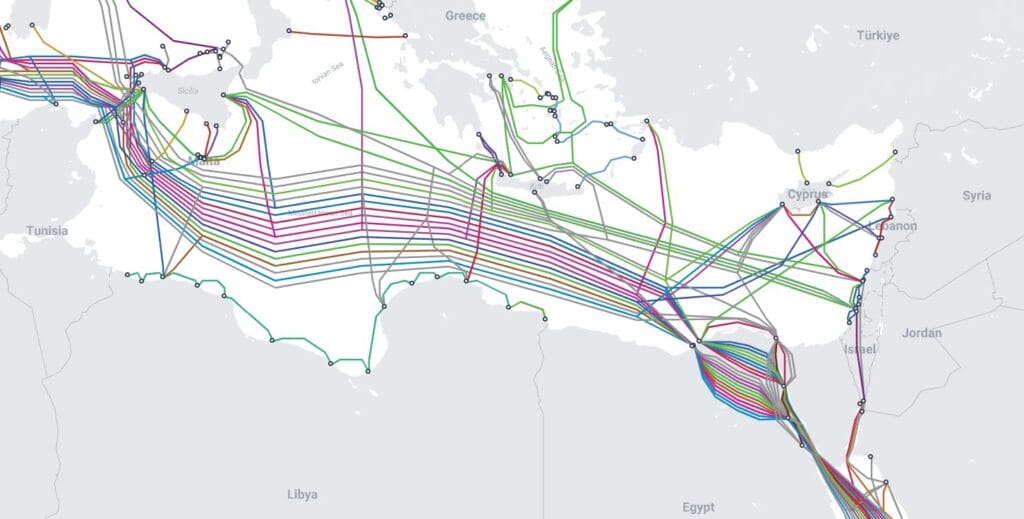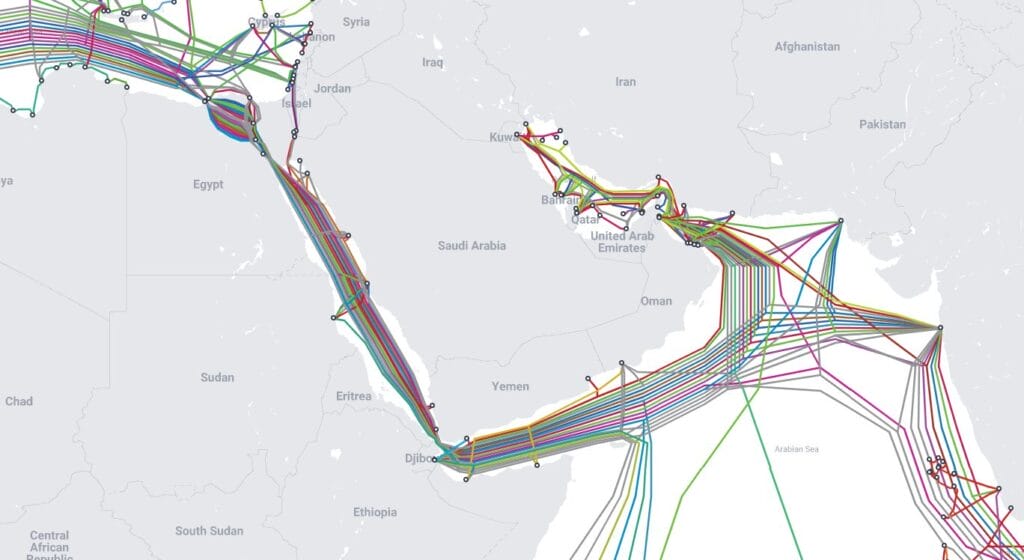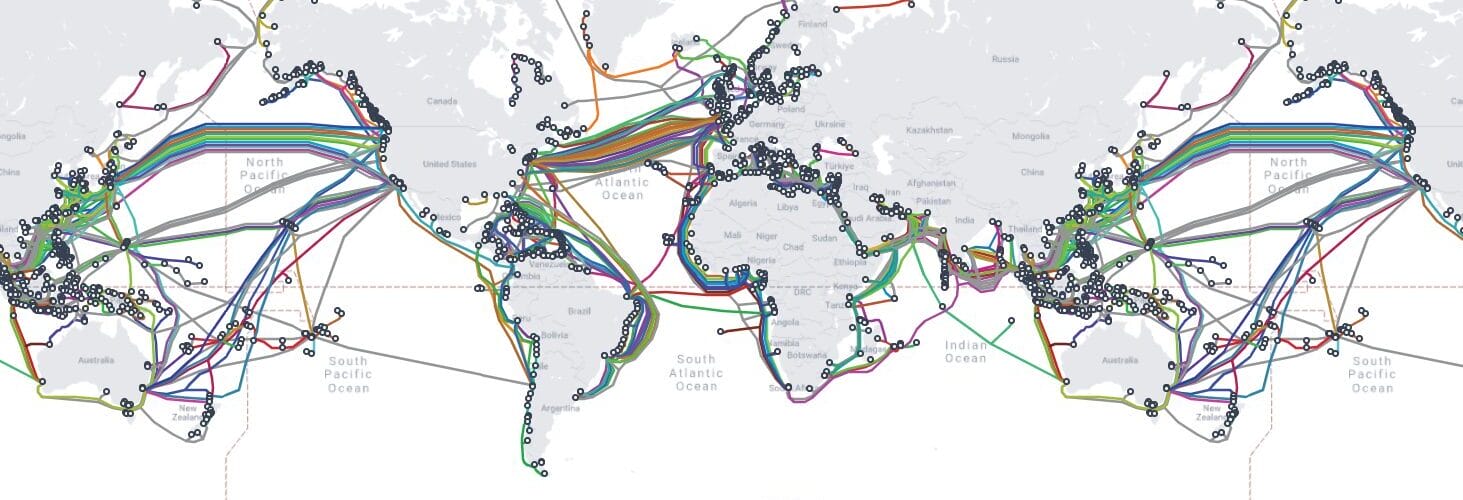The Houthis have been attacking freighter ships passing through the Red Sea for months, in response to the ongoing conflict in Gaza, which has then provoked the U.S. and other European-allied forces to issue retaliatory strikes against the Houthis. The attacks have disrupted global trade as many vessels have been forced to redirect their travel to longer routes, lest they be attacked. Recently one British cargo ship nearly sunk and forced the crew to abandon ship after sustaining significant damage.
Mainstream media, such as the BBC, had reported several weeks ago that the Houthis were perhaps planning to strike these submarine cables. Royal Navy submarine commander Rear Adm John Gower said at the time, “I assess it’s a bluff, unless it’s an attack on a terminal. [They] would need an ally with the capability, [someone with] a submersible plus the ability to locate [the cables],” he explained.
The BBC said that Iran would be that ally, should it be capable of pulling it off, though other military officials doubted Iran’s capabilities of cutting the cables, but did suggest that Iran may resort to using cyberattacks instead. However, the BBC made it very clear that such an attack would greatly exacerabte this war globally.
For Iran to enable an ally to sabotage the world’s undersea internet cables would also be a risky move on Tehran’s part. Neither Iran nor the US want to get into a full-scale war with each other and they have made that clear.
Cutting global communications cables would be a major escalation that could even result in retaliatory strikes on Iran itself.
“The Iranians might resort to cyber options sooner than sabotage of infrastructure,” said Edmund Fitton-Brown, who was the UK ambassador to Yemen from 2015-2017.
The BBC did also note, however, that the only two groups that supposedly cut pull such an operation off would be the U.S. or Russia. ‘The U.S. and Russia are both thought to have the naval capability to cut them. This involves deploying a deep-sea submersible from a mothership and then using what are, in effect, a giant pair of scissors for severing the cables on the ocean floor,’ the BBC wrote.
Submarine Cable Map provides a detailed, interactive list of the undersea cables around the world.


Fears of such an attack were originally put on notice after a Telegram account that linked to the Houthis depicted map of these cables, saying they were considering launch surgical strikes to damage the cords. The threat said: “There are maps of international cables connecting all regions of the world through the sea. It seems that Yemen is in a strategic location, as internet lines that connect entire continents – not only countries – pass near it.”

Emily Milliken for the Gulf International Forum explained just how critical these cables are to the world and the U.S. military:
Many people—both in the Middle East and across the world more generally—take for granted the modern comforts provided by undersea cables. In the twenty-first century, these cables serve as some of the world’s most critical digital infrastructure—servicing more than 95 percent of international data flows and communications—including an estimated $10 trillion in financial transactions every day. Even partial damage to the undersea cables could eliminate internet access across vast areas, causing major economic disruptions for entire countries.
Even more concerning for the Gulf Cooperation Council states, the United States, and Washington’s allies, damaging these cables could cut off military or government communications. The cables are the only hardware with enough bandwidth to accommodate the terabytes of military sensor data that inform ongoing operations. In the years to come, as technologies like artificial intelligence develop, the amount of data required to sustain advanced military operations will only increase.
Yemen sits at a critical juncture for these cables. Much as the Bab el-Mandeb acts like a chokepoint for maritime traffic above the waves, the region is one of only three cable chokepoints in the world, making threats to this infrastructure of particular concern to great powers like China and the United States, who are already competing for control over the cable network.
[…] A network of vital underwater communication cables could be the perfect soft target for their next attack and this possibility should concern all nations that depend on this critical infrastructure, both near and far.This morning it is being reported that these critical cables have been heavily damaged and the Houthis are getting blamed for it.
According to Gulf News, The Gulf Cooperation Council (GCC) – an union comprising six Arab countries: Bahrain, Kuwait, Oman, Qatar, Saudi Arabia, and the United Arab Emirates – internet connectivity amongst these countries have experienced “significant slowdown.”
The paper added:
This has led to a considerable interruption in the flow of data between Africa and Europe, affecting a vital cable system operated by the international telecommunications firm SECOM.
The company has confirmed a malfunction in its Red Sea infrastructure, particularly highlighting that a portion of its cable system ceased to operate due to the incident. The damage involves four submarine communication cables, with estimates suggesting that repairs could extend up to two months.
Additionally, Tech Spot reported: ‘Four of the at least 15 submarine cables that pass through the Bab al-Mandab Strait at the southern end of the Red Sea have been damaged in recent months. Israeli news publication Globes reports that the EIG, AAE-1, Seacom and TGN-EA cables were affected, with Seacom confirming its cable, which stretches between Kenya and Egypt, has experienced a break.’
Moreover, the tech publication said: ‘It was previously reported that the Houthis lack the submersibles necessary to reach the cables, but there are points where they run at a depth of 100 meters (328 feet), reducing the need for advanced submarines.’
The Hindustan Times also chimed in on the attacks.
But many in the comment section of that video, some of them claiming to Houthis, deny the allegations against them, claiming that the goal is to attack the ships and have said they would not go after the cables.
A top commentor wrote: “The Houthis denied they had any such intentions and the fact that the Israelis were so quick to pin the blame on them, suggests some sort of false flag… as one of the commentators on this thread alluded to, similar to assigning blame on Russia for the Nordstream pipeline explosion.”
This morning the Houthis have issued a number of short statements denying the Western media narrative. These early statements include:
Ministry of Communications denies validity of what is being circulated by Zionist enemy media regarding alleged damage to number of submarine cables in Red Sea last Saturday.
Ministry of Communications: Yemen’s Salvation government reaffirms its commitment to Yemen’s general stance regarding submarine cables, as stated in recent speech of Sayyed Abdulmalik Al-Houthi.
Ministry of Communications reiterates commitment to safeguarding all communication cables, services from any risks, to provide necessary facilitations for their repair, maintenance.
Ministry of Communications: Decision to prohibit passage of Israeli vessels does not apply to ships belonging to international companies licensed to carry out maritime cable operations in Yemeni waters.
Ministry of Communications affirms pivotal role in ensuring continuity, development of communications, internet services provided by submarine cables within Yemen’s territorial waters.
AUTHOR COMMENTARY
I have no idea where the truth rests in all of this, and none of us are ever really going to know what is happening; but I do know this: I will never trust Western media for anything, and I also know they always telegraph plans and agendas in advance. The BBC’s talks of cyberattacks plays right into the narrative that colossal outages loom, as has been planned and scripted for…
Be ready for the powers that be to flip-off the internet, social media, banking, GPS, and power grid for a time, because they will; and whatever the case may be here with this, this purported Houthis attack may very well act as the proxy to further expand this war in the Middle East.
Readers know that I have routinely harped about a false flag event to expand this war. Was this one it, or are there bigger ones to come after?
[7] And when ye shall hear of wars and rumours of wars, be ye not troubled: for such things must needs be; but the end shall not be yet. [8] For nation shall rise against nation, and kingdom against kingdom: and there shall be earthquakes in divers places, and there shall be famines and troubles: these are the beginnings of sorrows. Mark 13:7-8
[7] Who goeth a warfare any time at his own charges? who planteth a vineyard, and eateth not of the fruit thereof? or who feedeth a flock, and eateth not of the milk of the flock? [8] Say I these things as a man? or saith not the law the same also? [9] For it is written in the law of Moses, Thou shalt not muzzle the mouth of the ox that treadeth out the corn. Doth God take care for oxen? [10] Or saith he it altogether for our sakes? For our sakes, no doubt, this is written: that he that ploweth should plow in hope; and that he that thresheth in hope should be partaker of his hope. (1 Corinthians 9:7-10).
The WinePress needs your support! If God has laid it on your heart to want to contribute, please prayerfully consider donating to this ministry. If you cannot gift a monetary donation, then please donate your fervent prayers to keep this ministry going! Thank you and may God bless you.








I’m not falling for it. I’m calling baloney on that claim.
I fell for 9/11 but I won’t fall for this…and 9/11 was done by America, not Iraq!
A Cho Bai Dung and company op all the way just like Nordstream was
They need a ‘story’ for the planned demo & recarving of the world, & their are plenty of sinner players & ‘gods’ on every hand, & every ‘side’, willing to sell their souls for a cut of the devil’s false antichrist hope, glory & power.
Ugh! Who’s to know who is really guilty. As usual, we are being deceived and will never know who the real culprit is, but nonetheless, it still happened.